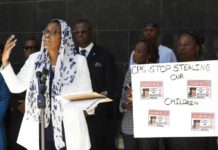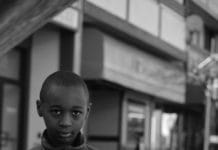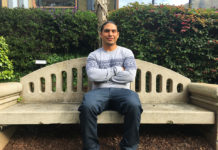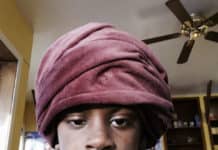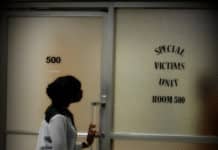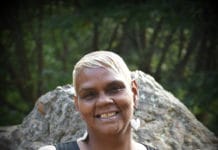by Eddie, Jacqueline M, Teresa V, Maria X, Sarbella and Lisa “Tiny” Gray-Garcia
Voices in Poverty Resist series, South LA
“I have no job and need to care for my 10-year-old daughter and 5-year-old son. I’m really depressed ‘cause as an immigrant I really can’t get a good job, but I wish for my dream to become a massage therapist and provide for my kids. But for now I have to deal with my own demons, which I call my problems. Because I don’t have a job, I’m thinking of giving my unborn son up for adoption.” – Jacqueline M., incest victim and migrante warrior mama of two children, CADRE LA
Throughout my childhood, my mama used to tell me stories of the violent abuse done to her poor body as a child of color living without a parent, unprotected, in foster homes, orphanages and shelters – stories that were so horrific I could barely listen without crying. This pain and multiple layers of so much trauma that was never healed was what eventually disabled her so she could not “compete” in the non-stop hustle-hamster wheel of capitalist life and eventually led to our homelessness.

In my case my mama went underground when we became houseless because she was constantly being threatened by CPS and not allowed to enroll me in school because we didn’t have an address. In the case of parents of color with children enrolled in the public schools, which are informed by white supremacy, it is a constant struggle to make sure our children get educated, rather than pushed out, criminalized and/or mis-educated.
“The struggle with my children’s school is the risk of being kicked out of school. And not knowing how to help, I am devastated. And right now I’m fighting with my 17-year-old for being a graffiti vandal. And I’m struggling with my 22-year-old with drugs. God is giving me the strength to keep on fighting. – Maria X, a rape victim and migrante mother of three children, CADRE LA
Mamas and daddies, like Ingrid de Leon from San Francisco, Eddie X, Jacqueline M and Teresa V from Los Angeles and all of the powerful African-American and migrante mamaz I was blessed to be with and speak with at the Voices in Poverty Resist workshop series we did at POOR Magazine in San Francisco and at CADRE (Community Assets Development–Redefining Education) in South-Central Los Angeles, spoke on their struggles to not only care for their children in lives that were constantly under pressure from landlords and employers and poor people health care providers, but also school systems that were rife with racist policies, high stakes testing and tracking of their children. At CADRE, the Black and Brown families in resistance work diligently to fight for their children’s education justice through multiple campaigns, speakouts, leadership trainings and community based surveys and direct outreach efforts.
“I left Guatemala to go north to Mexico and emigrate to the United States. To no longer be abused. No more abuse!” – Sarbella X, migrante warrior mama and incest survivor, CADRE LA
When I first met mi hermana en la lucha (my sister in the struggle) Ingrid De Leon, warrior mama of four children who crossed three borders just to support her family in Guatemala by any means necessary, she was fighting for the rights of immigrant mothers with her stories on POOR magazine’s Voces de inmigrantes en resistencia (Voices of Immigrants in Resistance) column.

In our visit to CADRE, a non-profit organization that works to redefine the role of parenting in South Los Angeles schools, we met with several powerful mothers who are fighting a racist and classist school system that criminalizes, tracks and tests poor youth of color in an attempt to raise their schoolwide test scores and reach the insane “standards” that are put on the increasingly budget strapped public schools in the U.S.
These mamaz and daddies work hard beyond their own struggles with poverty, abuse, racism and a pervasive anti-immigrant society to ensure that their children are not “pushed out” of school into the school to prison pipeline.
“My son was profiled and accused of doing something based on the fact that his last name was the same as another child who committed an alleged crime,” said one of the migrante warrior mamaz in the group, and then she began to cry, “The injustice was so deep that he eventually dropped out of school and to this day has no idea what he will do in his life.”
These mamaz and daddies work hard beyond their own struggles with poverty, abuse, racism and a pervasive anti-immigrant society to ensure that their children are not “pushed out” of school into the school to prison pipeline.
But these mama and daddy warriors put their own struggles deep down into their own already wounded hearts and continue to struggle for their children’s safety, justice and education – or as my mama used to say, keep on keeping on no matta what!
The following story was one of several written for the Voices of Poverty Resist series in workshops led by Lisa “Tiny” Gray-Garcia. The workshops were held at LA CAN and CADRE in LA, HOMEFULNESS in Oakland and POOR Magazine in San Francisco. The series was launched by Lisa when she received the Marguerite Casey Foundation Equal Voice Journalism Fellowship Award focused on the criminalization of families and communities in poverty. Because Lisa leads with her indigenous values of inter-dependence and collaboration and has struggled with poverty and houselessness for most of her childhood with her disabled single mother of color and the grant allowed for looking at the way that language, culture and race influence public attitudes about peoples in poverty, she created this collective journalism process where all of our voices in poverty are speaking for ourselves to achieve a collective and truly inclusive challenge to the “otherizing” that usually happens by corporate and independent media producers when “covering” poverty issues or speaking for all of us poor peoples of color.
It made us feel like criminals
by Eddie, CADRE LA
In 2002 my wife and I both lost our jobs. We were homeless with three children under 10 years old. We were forced to share a house with another family.
We lived in one room, all five of us. We slept and watched TV and everything in this room. We had to share the bathroom and the other parts of the house with 10-13 other people.
We were not allowed to use the backyard. It stayed locked like we would steal something. It made us feel like criminals. But through this experience we have come closer to God and each other. It made us trust and believe in God, trust and believe in each other as a family.
Tiny – or Lisa Gray-Garcia – is co-founder with her Mama Dee and co-editor with Tony Robles of POOR Magazine and its many projects and author of “Criminal of Poverty: Growing Up Homeless in America,” published by City Lights. She can be reached at deeandtiny@poormagazine.org. Visit www.tinygraygarcia.com and www.racepovertymediajustice.org.

 Store
Store




